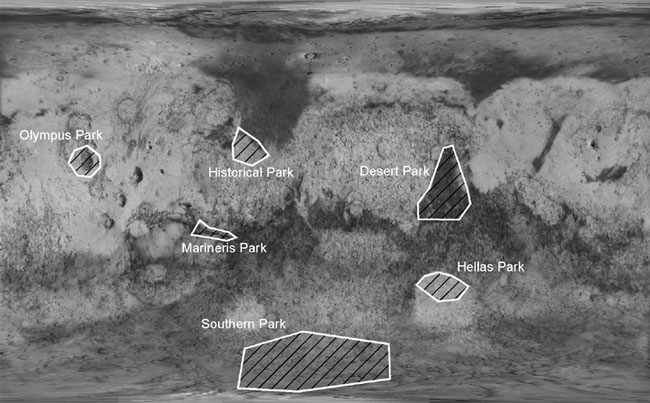Planetary Parks Proposed For Mars Conservation

A set of seven 'planetary parks' have been proposed for the conservation of the martian environment by two European scientists. Each of the parks contain representative features of the landscape on Mars.
The Polar Park would protect the martian ice cap; Olympus Park would make the largest volcano in the solar system, Olympus Mons, safe from commercialism and exploitation. Charles Cockell, a Britich microbiologist, and Gerda Horneck, a German astrobiologist, point out that many parks on Earth were established to protect their natural beauty, not just wildlife.
Among the many barriers to this proposal is the fact that while many nations, including the United States, Russia and China, have signed the UN Outer Space Treaty, few have ratified the 1979 Moon Agreement. This agreement specifically seeks to regulate the exploration and exploitation of natural resources found on the Moon and other celestial bodies; the U.S. has not ratified this agreement.

Saturn was quite a sight as it came looming up... Alas, only the two inner rings remain. Despite violent protests by ecologists and cosmologists, the Better Building Conglomerate had been permitted to harvest the third outer ring for some kind of better building aggregate. There was a housing crisis, and the [Conglomerate] paid enormous taxes. One infuriated astronomer had been euthanized for burning the chairman of the board.
Also, natural and manmade caves on the Moon were used for recreation in Robert Heinlein's The Menace From Earth; loonies used Bat's Wings to flap around and enjoy themselves.
Read more at Scientists propose conservation parks on Mars.
(This Science Fiction in the News story used with permission from Technovelgy.com - where science meets fiction.)
Get the Space.com Newsletter
Breaking space news, the latest updates on rocket launches, skywatching events and more!
Join our Space Forums to keep talking space on the latest missions, night sky and more! And if you have a news tip, correction or comment, let us know at: community@space.com.
Bill Christensen is the founder and editor of Technovelgy, a website dedicated to cataloguing the inventions, technology and ideas of science fiction writers. Bill is a dedicated reader of science fiction with a passion about science and the history of ideas. For 10 years, he worked as writer creating technical documentation for large companies such as Ford, Unisys and Northern Telecom and currently works to found and maintain large websites. You can see Bill's latest project on Twitter.









